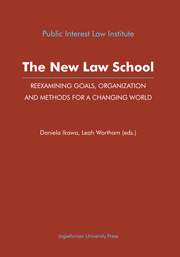Book contents
- Frontmatter
- Contents
- Preface
- Acknowledgments
- Introduction
- Part One Goals of Legal Education
- Part Two Law School Governance
- Part Three Optimal Academic Curricula and Teaching Methods
- Part Four The Academic Career in Law
- Chapter 7 The Challenges of the Mass University and the Civil Law Country Model of Legal Education: How Open Is the Polish University Model to Innovative Teaching and Nurturing of Clinical Programs?
- Chapter 8 Croatian Legal Education Reform at the Crossroads: Preparing the Modern Lawyer
- Chapter 9 The Need for a New Law Professor in Moldova
- Chapter 10 Some Aspects of Academic Legal Careers in Georgia
- Appendix
Chapter 7 - The Challenges of the Mass University and the Civil Law Country Model of Legal Education: How Open Is the Polish University Model to Innovative Teaching and Nurturing of Clinical Programs?
from Part Four - The Academic Career in Law
Published online by Cambridge University Press: 05 September 2014
- Frontmatter
- Contents
- Preface
- Acknowledgments
- Introduction
- Part One Goals of Legal Education
- Part Two Law School Governance
- Part Three Optimal Academic Curricula and Teaching Methods
- Part Four The Academic Career in Law
- Chapter 7 The Challenges of the Mass University and the Civil Law Country Model of Legal Education: How Open Is the Polish University Model to Innovative Teaching and Nurturing of Clinical Programs?
- Chapter 8 Croatian Legal Education Reform at the Crossroads: Preparing the Modern Lawyer
- Chapter 9 The Need for a New Law Professor in Moldova
- Chapter 10 Some Aspects of Academic Legal Careers in Georgia
- Appendix
Summary
Introduction
The legal clinic program at the Jagiellonian University was established more than ten years ago. Since then, almost every law school in Poland has organized a program that at least aspires to be a “legal clinic.” Even the Polish private law schools competing with the established state institutions have accepted clinical programs as necessary components of the law schools. Poland has been extremely successful in organizing, promoting, and developing these programs, establishing a national Foundation for Legal Clinics that supervises clinical programs by testing their setting, equipment, reliability, and compliance with adopted ethical standards. The clinical programs survived the cutoff of the substantial external funding of the pioneer era. Despite this success, however, the role and function of the legal clinics in Poland is still not fully decided.
Clinical programs are entering a phase of transition from the first generation of clinical teachers to the next. This transition is sometimes complicated. The clinics’ founders benefited immensely from their participation in the process of establishing the clinics: they were supported by external international funding; they developed professional and personal relationships; and they had opportunities to travel for conferences, receive training, and to train others. Moreover, they have witnessed the development of the project, as well as its success. The next generation of teachers is beginning its work with far fewer incentives.
- Type
- Chapter
- Information
- The New Law SchoolReexamining Goals, Organization and Methods for a Changing World, pp. 81 - 86Publisher: Jagiellonian University PressPrint publication year: 2010



